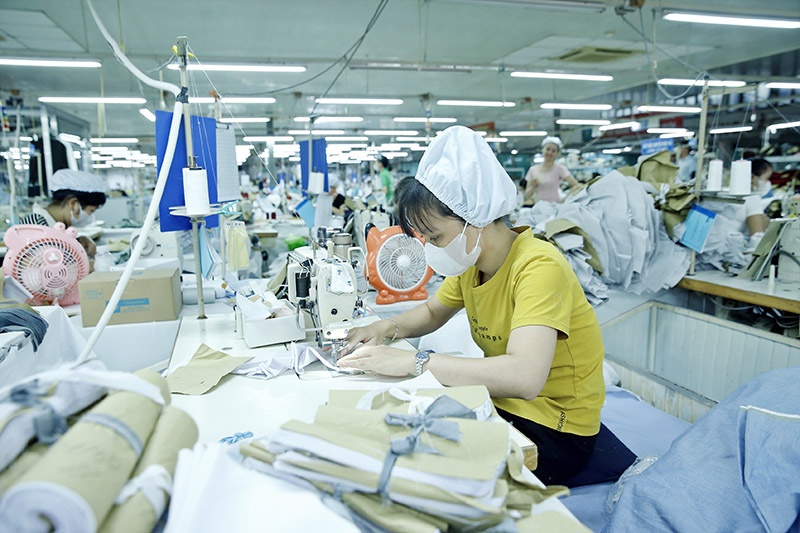European businesses express cautious optimism
 |
On July 15, the European Chamber of Commerce in Vietnam (EuroCham) unveiled its second quarter 2024 BCI report, offering a nuanced perspective on the economic landscape for European enterprises in Vietnam.
"Vietnam's economic potential is undeniable, and the European business community remains confident in its long-term growth," said Dominik Meichle, chairman of EuroCham Vietnam. "While our survey points to areas for improvement, we believe that by working together to address administrative and regulatory hurdles, we can create a more efficient and attractive business environment that benefits both the European and Vietnamese business communities."
"This survey, powered by our members' real-world experiences, is the backbone of our advocacy work. It shapes our conversations with Vietnamese officials and EU policymakers. By bringing our members' perspectives to the table, we are identifying key areas for growth and strengthening the Europe-Vietnam partnership through open dialogue and teamwork."
Thue Quist Thomasen, CEO of Decision Lab, pointed out that underlying confidence was robust.
"These survey results reveal a nuanced picture of the business landscape," said Thomasen. "While 68 per cent of respondents report neutral to positive current conditions, there is a slight increase in short-term caution, which needs to be addressed to continue the positive trend from the previous quarters. However, the strong 6.42 per cent GDP growth in the first half of 2024 and nearly 70 per cent expressing long-term optimism indicate robust underlying confidence that may materialise in future readings."
The survey paints a mixed picture, reflecting both resilience and ongoing challenges. While fewer companies report the economic situation as "very poor" (decreasing from 8 per cent to 6 per cent), those describing it as "not good" increased slightly (from 24 per cent to 26 per cent). Despite this, a majority (68 per cent) still maintain a neutral to positive outlook regarding their own business conditions, suggesting an overall sense of stability.
Though overall sentiment towards Vietnam's economic outlook in the third quarter of 2024 is cautiously optimistic (45 per cent), individual businesses are more hesitant about their own prospects for the quarter, with 45 per cent remaining neutral and 23 per cent expressing concerns.
This short-term uncertainty is balanced by robust long-term confidence, with nearly 70 per cent of businesses expressing optimism about Vietnam's economic growth over the next five years. This confidence is further reflected in the fact that a comparable percentage would recommend Vietnam as an investment destination.
The survey also highlights specific areas where regulatory hurdles are particularly pronounced. Despite the introduction of Decree No.70 in September 2023 to streamline work permit and visa procedures for foreign workers, only 3.3 per cent of respondents report significant improvements. While half acknowledge some progress, a quarter indicates no change. Enhancing this process is crucial for attracting international talent and fostering knowledge exchange.
Meanwhile, the recently implemented Personal Data Protection Decree, designed to safeguard personal information, has inadvertently caused uncertainty among businesses. A quarter of survey respondents admit to not fully understanding the decree's requirements, and only a third feel confident in their ability to comply. This highlights the need for clearer guidance and support from authorities to ensure a smooth transition and compliance.
To entice more foreign direct investment and stimulate economic growth, businesses surveyed highlighted five key areas where Vietnam could enhance its business environment: streamlining administrative and procedural processes; enhancing clarity and precision in laws to reduce arbitrary interpretation; developing core infrastructure (roads, ports, bridges, among others); simplifying visa and work permit procedures for foreign experts; and ensuring political stability and security.
In addition, the survey reveals a growing commitment to sustainability among European businesses in Vietnam, with 7 per cent having already achieved carbon neutrality. An impressive 37 per cent have set targets to reach this goal by or before 2050, while an even more ambitious 18 per cent aim to achieve carbon neutrality by 2030.
However, the surveyed businesses identified several key obstacles in their net-zero efforts, including customer resistance to paying premium prices for sustainable products, inadequate government incentives and regulations to promote sustainability, limited access to clean energy sources and effective waste management infrastructure, financial constraints in implementing sustainable practices, lack of employee awareness and engagement with sustainability initiatives, and difficulty measuring emissions and ensuring supply chain compliance.
On a positive note, the recent signing of the Direct Power Purchase Agreement decree offers a ray of hope. Swift and successful implementation could address some of these challenges, particularly by improving access to clean energy sources and potentially providing better sustainability incentives.
 | Vietnam deemed cost-effective for Euro expansion European businesses continue to pin their hopes on the recovery in Vietnam by fuelling further business expansion. |
 | European business confidence gains traction in Vietnam Confidence among European businesses operating in Vietnam is showing signs of resilience as the latest Business Confidence Index (BCI) from the European Chamber of Commerce in Vietnam (EuroCham) reached 46.3 points in the fourth quarter of 2023. |
 | Binh Phuoc calls for investment from European businesses The southern province of Binh Phuoc is calling for foreign investment in high-tech agricultural projects, food processing, large-scale production, and renewable energy. |
What the stars mean:
★ Poor ★ ★ Promising ★★★ Good ★★★★ Very good ★★★★★ Exceptional
Related Contents
Latest News
More News
- A golden time to shine within ASEAN (February 19, 2026 | 20:22)
- Vietnam’s pivotal year for advancing sustainability (February 19, 2026 | 08:44)
- Strengthening the core role of industry and trade (February 19, 2026 | 08:35)
- Future orientations for healthcare improvements (February 19, 2026 | 08:29)
- Infrastructure orientations suitable for a new chapter (February 19, 2026 | 08:15)
- Innovation breakthroughs that can elevate the nation (February 19, 2026 | 08:08)
- ABB Robotics hosts SOMA Value Provider Conference in Vietnam (February 19, 2026 | 08:00)
- Entire financial sector steps firmly into a new spring (February 17, 2026 | 13:40)
- Digital security fundamental for better and faster decision-making (February 13, 2026 | 10:50)
- Aircraft makers urge out-the-box thinking (February 13, 2026 | 10:39)

 Tag:
Tag:

















 Mobile Version
Mobile Version